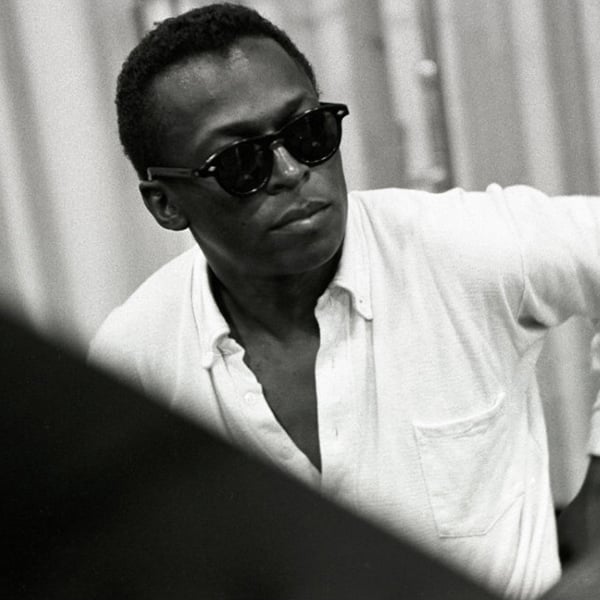
Whether by plan or happenchance, the third studio album featuring Miles with his Shorter-Hancock-Carter-Williams lineup was a darker, more moody answer to the heat and volume of Miles Smiles. Not that it was delicate either. Recorded mid-May in 1966, Sorcerer is named for pianist Herbie Hancock’s sole contribution on the album “The Sorcerer” (his nickname for Miles), a track distinguished by its own kind of muscle and push.
The rest of the album is defined by the consistently pensive, abstract effect the quintet was so good at: one by drummer Tony Williams—a bittersweet ballad called “Pee Wee” on which Miles laid out—and a quirky vocal number featuring the singer Bob Dorough with Gil Evans arranging: “Nothing Like You,” a Dorough original recorded back in 1962 with a sextet that included no piano and Wayne Shorter, two years before he joined Miles.
It’s the four tunes composed by saxophonist Shorter that steal the show here. “Prince of Darkness” (which became a more popular nickname for Miles), “Masqualero”— “Limbo,” “Vonetta,” and all are forms that are elastic in form and kaleidoscopic with multiple rhythmic feels, either because they were written that way or because the band itself could choose when to go where, mid-performance, as Hancock and Carter do on “Masqualero.”
“Masqualero” includes a couple of favorite tricks of the band (Miles and Shorter playing unison lines a hair apart, giving it an echo-y feel) and of Shorter’s compositional approach, like favoring intervals based on fourths which, as Bill Evans did on Kind of Blue, lending it a harmonic and mysterious, emotional ambivalence. Another Shorterism: playing the theme and stretching it out phrase by phrase, the wide gaps in-between filled with either a second melodic line or short improvisations filling in the blank. The effect is like viewing shifting planes of focus, two stories being told at the same time. In the end, it was the quintet’s skills of invention that made it make sense and kept it interesting.
Sorcerer is a smartly sequenced listen, start to finish. Its cover reflects Miles’ ongoing romantic life post-Frances; his next love, actor Cicely Tyson, is on the cover, in Cleopatra-like profile. Liner notes were again penned by Ralph J. Gleason: another elegaic poem, this one creatively spelling Miles’ name. MA-ULZ. MY-ULZ. MY-ILLS!










